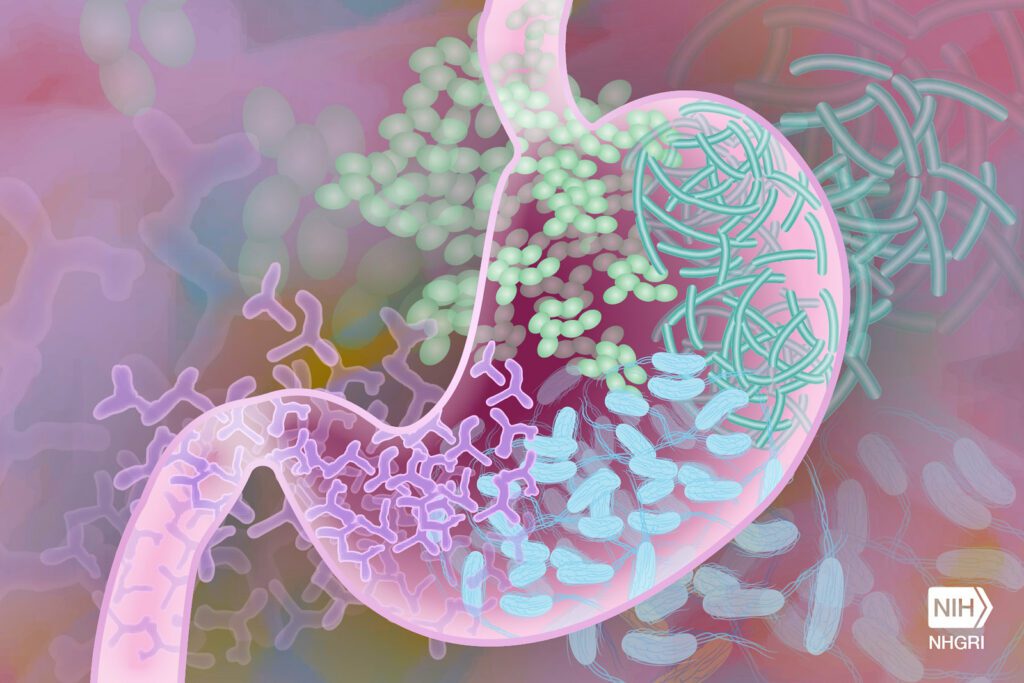Your gastrointestinal tract plays an essential role in your health. As food travels from the mouth to the stomach, it is converted into nutrients and stored energy and helps expel waste. Optimal gut health does wonders for your well-being.
However, emotional stress and chronic diseases (cancer and diabetes) are also related to the gastrointestinal tract. This is because when we process our food, trillions of bacteria inhabit the gastrointestinal tract and maintain our gut health.
Your gut microbiome is a collection of bacteria and microorganisms in your stomach and intestines. In turn, it is the key to many health problems. Gut health can be affected by certain environments, foods, and behaviors. What can you do to improve it?
Why is gut health important?

The intestine breaks down all food into a simple form so that it can be absorbed into the bloodstream and transported throughout the body as nutrients. Maintaining a healthy digestive system is essential.
As a barrier, the intestinal wall is crucial for immune function. A healthy gut repels bacteria and viruses that contribute to infections. With a healthy gut, the nerves and hormones have enough energy to communicate with the brain and thus maintain the overall health of the body.
When you do not maintain good intestinal health you can develop:
- Irritable Bowel Syndrome (IBS)
- Inflammatory Bowel Disease (IBD)
- Celiac Disease
- Permeability in the intestinal wall, which makes you more susceptible to infections
Gut health also affects mental health

The gut-brain axis is responsible for communication between the gut and the brain. This connection makes your gut like your “second brain.” Through its process, intestinal bacteria send messages to the brain. They affect our mental process, in relation to decision-making, since they also release hormones similar to those produced by our body.
An imbalance in gut bacteria can cause things like irritability and brain fog. Therefore, stress can also affect intestinal health and cause an imbalance, especially when you produce a sugar addiction in your two brains.
How can you detect intestinal health problems?
Intestinal imbalances are usually easy to identify:

- The feeling of swelling, inflammation
- Gases
- Dizziness
- Nausea
- Stomach ache
These imbalances often resolve themselves after a short time. But they could also become chronic and require medical attention. A gastroenterologist looks at specific conditions related to your microbiome and the growth of certain bacteria. Therefore, it is not appropriate to do commercial tests, go directly to consult with your specialist.
You must sense that something is wrong when you are constipated, gain weight, have diarrhea, bloating, and gas. Bad breath and skin irritation are also common problems in some cases. All this affects your quality of life.
You already have healthy bacteria in your gut. However, you can control the environment in which they grow and thrive.
What can you do to keep your gut healthy?
Good gut health requires a balanced diet, hydration, regular exercise, and a good night’s sleep. If you are healthy your gut will be too.
As with other parts of your body, bad habits also damage your microbiome. Especially when you smoke and drink excessively, or when you take certain medications without consulting your doctor.
Thus, you can improve intestinal health by limiting the consumption of dairy, red meat and refined sugars. It is also recommended to consume 20 to 40 grams of fiber per day, depending on your age and gender. Healthy fiber comes from foods like fruits, vegetables, whole grains, nuts, and seeds.
Good and bad foods for your gut health
The overgrowth of bad bacteria in the gut is linked to eating a lot of sugar, artificial sweeteners, processed foods, and alcohol. Take this in moderation.

Feed your gut bacteria with prebiotics and probiotics: whole grains, onions, garlic, fermented foods, fiber, and yogurt.

The key is to a balanced and healthy diet.
Do certain medications and treatments affect gut health?
Gut health is damaged by all kinds of medications, from antibiotics to antidepressants. Some medications may kill some bacteria, which is an imbalance.
Medications that decrease the amount of acid produced by the stomach, so the more antibiotics you take, the more the imbalance will be.
Radiotherapy or chemotherapy treatments can also cause diarrhea and other gastrointestinal side effects. So, is important to consult with your health care team to add supplements to protect your gut health in these vulnerable times.
Support the good bacteria in your gut
Changes in your healthy habits should be gradual but consistent. Don’t forget to get enough sleep and monitor your stress levels. All this will help your intestinal health.
Also start small with changes to your diet. Eat seasonally for a healthier diet. Seasonal fruits and vegetables are more nutritious and make you maintain a varied diet. Also, remember to chew your food very well. Try to eat well before resorting to supplements, vitamins, and probiotics.
When to seek medical attention in case of intestinal problems?
See your doctor if you have been experiencing abnormal bowel habits for a few weeks or months.
It’s important for cancer patients to let their care team know if they notice any changes in their bowel habits or if they’re rapidly losing or gaining weight.
Is it good to take probiotics?

They are known as the “good bacteria” that do wonders for the average organism.
Through clinical studies over the past 100 years, we know that probiotics fight disease-causing microorganisms.
Then, these are the benefits of probiotics:
- They help digestion
- better absorb nutrients
- Improve immune function
- Reduce constipation and diarrhea associated with IBS
- Control allergies, eczema, and vaginal infections
- They benefit the urinary tract, pouchitis, and remission of ulcerative colitis
- Improve the health of people with serious chronic diseases, such as type 2 diabetes
However, they are not the only solution for your health either. Researchers have shown that a well-balanced microbiome includes probiotics and nutrients. Only in this way can you contribute to a healthy digestive system and immune system.
Research indicates that probiotics are low-risk and probably beneficial, as long as a nutrient-dense diet helps.
Consult your doctor first to choose the most beneficial supplements and probiotics for you.
Did you learn more about gut health? Read more about other medical topics at Essential Medical Clinic:


